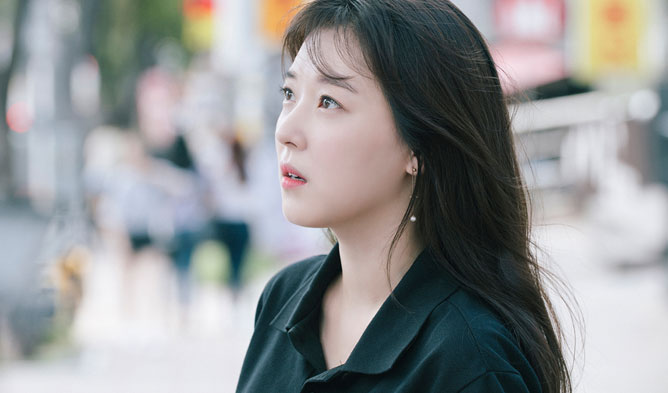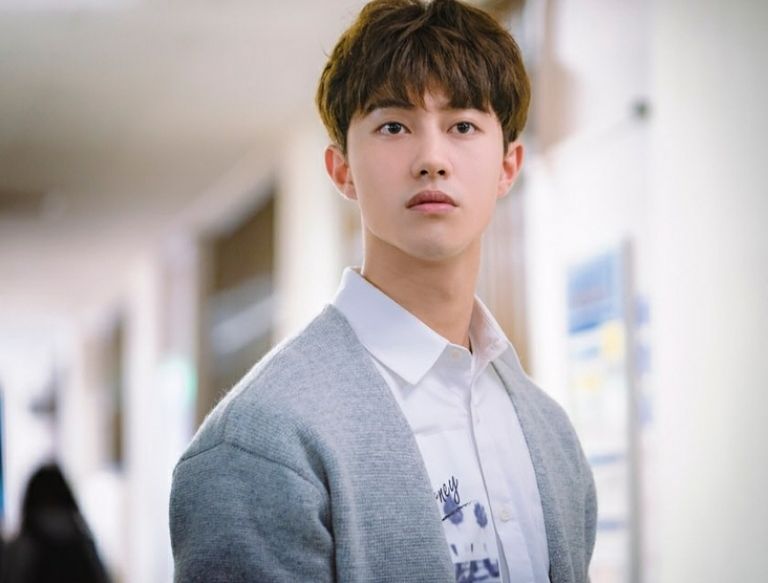For anyone who doesn't know, My ID is Gangnam Beauty explores a story about a girl, bullied her entire life over her 'ugly' appearance, who pays for completely reconstructive plastic surgery. Then she's bullied for that instead. It also follows her budding romance with a classmate from middle school, who is entirely immune to lookism and the social importance placed on outward appearance.
What I've taken away the most, I suppose, is a happier perspective on the characters; the supporting cast isn't particularly interesting at all, with the majority of the fellow students partaking in or passive to blatant power harassment, sexism and bullying. The main four, however (pictured on the right) seem to represent reversals of common character roles in similar coming-of-age youth romance stories. I want to go through each of them, which will hopefully demonstrate what I've come to appreciate about Gangnam Beauty.
There are instances were these kind of themes pop up in Gangnam Beauty, but it's far removed from relying solely on popular tropes. The heroine, Kang Mi-rae, doesn't wear the fact she struggles to save money like a label - after all, this a university setting, almost everyone is poor. When it comes to Do Kyung-seok, it seems the writers were more concerned with how being rich would affect his personality. And no, he isn't particular snobbish or miserly. Rather, his ignorance over financial matters makes him naive, and working around that is a large part of his arc in the second half of the series.
Do I think the webtoon author horned in these stereotypes because they're well-received? Yes I do. There are plenty of instances where Gangnam Beauty is sickening with the romance, and it's clear that realistic wasn't exactly what they were going for there (count how many times she falls into his arms). But the point here is that the two are not solely defined by them. Gangnam Beauty has a message, and it's far more concerned with delivering that.
What I find most interesting after re-watching is the second leads. Look at the poster above, and they seem pretty stereotypical, right? Hyun Soo-ah is clearly the duplicitous popular girl interested in the male lead, and he's the sweeter and kinder alternative interested in the female lead? Well, you're right and wrong.
 Soo-ah is a seriously interesting character, because it's incredibly difficult to treat her like a 'villain'. Unlike, say, Park Si-eun's character in Delightful Girl Choon-hyang, Soo-ah's motives in sabotaging the the romance between the leads aren't born out of jealousy, or a love turned to obsession. Rather, she never loved Kyung-seok in the first place. Gangnam Beauty is unique in that her problems with needing to be the center of attention (which later spiral into more serious issues like implied bulimia) are recognized as mental illness. Moreover, they're approached in a pretty sensitive way! Few dramas will actually do that. Thus, Gangnam Beauty tackled the prejudices against plastic surgery, and the mental damage that crippling beauty standards can do, all in one go. And Soo-ah sorted herself out in the end - not because the drama copped out and suddenly made her not-evil (like Wolgyesu), but because she'd recovered from her illness and emerged with a better sense of self.
Soo-ah is a seriously interesting character, because it's incredibly difficult to treat her like a 'villain'. Unlike, say, Park Si-eun's character in Delightful Girl Choon-hyang, Soo-ah's motives in sabotaging the the romance between the leads aren't born out of jealousy, or a love turned to obsession. Rather, she never loved Kyung-seok in the first place. Gangnam Beauty is unique in that her problems with needing to be the center of attention (which later spiral into more serious issues like implied bulimia) are recognized as mental illness. Moreover, they're approached in a pretty sensitive way! Few dramas will actually do that. Thus, Gangnam Beauty tackled the prejudices against plastic surgery, and the mental damage that crippling beauty standards can do, all in one go. And Soo-ah sorted herself out in the end - not because the drama copped out and suddenly made her not-evil (like Wolgyesu), but because she'd recovered from her illness and emerged with a better sense of self. But Woo-young is even more interesting, in that he's actually the closest to a realistic guy I think I've ever seen in a youth drama. Gangnam Beauty presents him as a classic nice-guy with his harmless appearance and chilled nature, but uses his character to point out that an attraction to someone based on appearance isn't shallow, it's ordinary. When he tells Mi-rae that he liked her because she was pretty (despite the fact that her beauty was entirely constructed) and she acted disappointed, he established the difference between attraction and genuine feelings. He pursued her because she was pretty, and came to like all the intricacies of her personality. Does this make him shallow? No, it makes him normal, and he's still a good guy. Obviously, he'd be a great choice for Mi-rae, were Kyung-seok not completely impervious to beauty and otherwise perfect. What I'm saying here is that, although Gangnam Beauty is not always subtle, it touches on some issues I've actually never seen explored in Korean drama before. Or even ever.
But Woo-young is even more interesting, in that he's actually the closest to a realistic guy I think I've ever seen in a youth drama. Gangnam Beauty presents him as a classic nice-guy with his harmless appearance and chilled nature, but uses his character to point out that an attraction to someone based on appearance isn't shallow, it's ordinary. When he tells Mi-rae that he liked her because she was pretty (despite the fact that her beauty was entirely constructed) and she acted disappointed, he established the difference between attraction and genuine feelings. He pursued her because she was pretty, and came to like all the intricacies of her personality. Does this make him shallow? No, it makes him normal, and he's still a good guy. Obviously, he'd be a great choice for Mi-rae, were Kyung-seok not completely impervious to beauty and otherwise perfect. What I'm saying here is that, although Gangnam Beauty is not always subtle, it touches on some issues I've actually never seen explored in Korean drama before. Or even ever.In summation, it's easy enough not to like this show - however, no-one can claim that it was just a thoughtless adaptation, that it lazily followed popular tropes (well, sometimes it did, but still). There are plenty of reasons to justify the popularity it experienced!

No comments:
Post a Comment